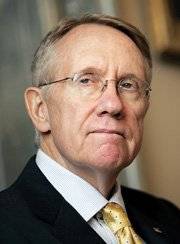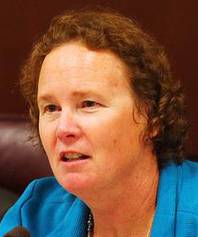Wednesday, Sept. 23, 2009 | 2 a.m.

Harry Reid
In Today's Sun
Sun Archives
- Harry Reid cuts Medicaid deal for Nevada (9-22-2009)
- Ensign will offer 30 tweaks to health care bill (9-22-2009)
- How the overhaul could alter the popular but costly Medicare Advantage (9-20-2009)
- Sticker shock: How the overhaul could exact a heavy toll on state finances (9-20-2009)
- Desperate for insurance, residents share health care woes (9-18-2009)
- Nationwide tour promoting health care reform ends in Las Vegas (9-18-2009)
- Harry Reid: Health care bill won't work for Nevada (9-16-2009)
- Grant to aid 400 waiting for Medicare (9-14-2009)
- Editorial: Lowering Medicare costs (9-2-2009)
- Medicare Advantage plans may lose federal cash (1-16-2009)
Senate Majority Leader Harry Reid secured a better deal for Nevada in the health care bill Tuesday — 100 percent federal funding for the state’s initial expansion of Medicaid to cover uninsured, low-income residents.
But even this legislative maneuvering may not be good enough for Nevada’s budget hawks and opponents of the health care reform bill making its way through Congress.
Nevada and three other states hard-hit by the downturn and dealing with the nation’s highest unemployment rates — Michigan, Rhode Island and Oregon — would benefit from the deal Reid reached with Democratic Sen. Max Baucus of Montana, chairman of the Senate Finance Committee.
The health care bills making their way through Congress aim to provide insurance to those without coverage in part by expanding state Medicaid programs, which now serve primarily low-income women, children, seniors and the disabled. The federal government splits the cost of the program with states.
Under the initial Senate legislation, the federal government would have provided most of the funding, up to 95 percent in some cases, for every additional dollar states spend insuring the poor through Medicaid.
States would have had to pony up the remainder — 5 percent for some states, more for others. Nevada would have had to provide up to 18 percent, boosting its annual $800 million Medicaid budget by 5 percent — one of the steepest increases in the nation.
Reid complained last week that the rates for Nevada were too high, and he vowed not to bring a bill to the Senate floor unless he got a better deal.
Nevada Gov. Jim Gibbons and state lawmakers from both sides of the aisle said there was essentially no way the deficit-ridden state could dig into its general fund coffers to expand care for the uninsured.
The deal Reid struck would give the four states 100 percent funding to expand Medicaid for the first five years. After that, Nevada would have to pay 18 percent of the costs.
“I promised the people of Nevada that I wouldn’t support any health insurance reform proposal that wasn’t good for our state, and I meant it,” Reid said in a statement announcing the change. With the 100 percent funding and other changes in the legislation, Nevada would face a much smaller increase in Medicaid spending over the next 10 years — 1.6 percent, according to Washington estimates released Tuesday.
Reid’s office noted that the state would receive a 30 percent increase in federal funding for its Medicaid program under the health care bill, and would be required to chip in a 1.6 percent match.
Reid called the latest proposal “a major improvement.”
Reid endured political barbs for suggesting he would use his clout as majority leader to cut a deal. More grumbling is expected from states that are not among the beneficiaries.
But the true test of Reid’s legislative skills now comes in Carson City, where even 100 percent financing may not be enough to win support.
Assemblywoman Sheila Leslie, D-Reno, one of the state’s most liberal lawmakers, said Reid’s efforts to expand the federal contribution make the proposal more palatable.

Sheila Leslie
“I’m not saying it’s going to be easy to find that money, but it sounds like we’re pushing it five years down the road,” she said. “Hopefully by then we can see whether health care reform has worked.”
But Gibbons’ deputy chief of staff, Stacy Woodbury, said even at full funding, the state would be wary because it would eventually have to pay more for the increased coverage.
“The governor’s position has not changed,” Woodbury said. “The state does not have sufficient funds for the current state budget, much less for an expansion in Medicaid.”
The Medicaid expansion under the House and Senate bills would require the state to provide health insurance via Medicaid to a greater swath of Nevadans than are now eligible.
The state would need to provide coverage for all children and parents who are poor, with incomes, for example, below $24,300 for a family of three. Currently, only children are covered at this income level. Working parents are covered if they earn less than $16,600 in a family of three.
Additionally, the bill would require all states to provide a new category of coverage — low-income childless adults ages 19-64 who make less than $14,400 a year. These people are currently not eligible for Medicaid in Nevada.
The state’s Medicaid administrator has said these changes would create a huge increase in the number of Nevadans insured by Medicaid.
Currently 220,000 Nevadans are enrolled in Medicaid. Estimates released Tuesday in Washington show more than 236,000 Nevadans would be newly eligible for care and more than 120,000 would enroll.
Nevada would have to pay up to an additional $23 million a year toward Medicaid by 2018. Once the state’s 100 percent match ends, the state would face an additional $122 million in Medicaid costs, according to committee estimates.
Charles Duarte, the state’s Medicaid administrator, said of the proposed 100 percent match: “Obviously it’s a step in the right direction.”
But Duarte remains concerned about the state’s long-term ability to pay the bills. “We’re not just worried about this recession. We’re worried about future economic downturns,” he said. “What projections do we have in the future to pay for health care?”
Republican Sen. John Ensign has introduced an amendment to eliminate the Medicaid expansion for any state that sees its Medicaid bills go up by more than 1 percent.
But Democratic Rep. Shelley Berkley notes that Nevadans are already paying to care for the uninsured through the higher premiums those with health care coverage pay to cover those who cannot pay their bills. Berkley calls this the “hidden tax.”
Jon Sasser, a state advocate who has long pushed to expand Medicaid in Nevada, said it’s one of the cheapest ways to cover the uninsured.
“Taxpayers pay one way or another,” he said. “Whether it’s state taxes, federal taxes or higher insurance premiums. There’s not a free ride for Nevadans in any way.”
David McGrath Schwartz reported from Carson City.

Join the Discussion:
Check this out for a full explanation of our conversion to the LiveFyre commenting system and instructions on how to sign up for an account.
Full comments policy